Leader vs. Manager: Roles, Functions and Leadership Styles
VerifiedAdded on 2021/01/01
|13
|4305
|245
Report
AI Summary
This report analyzes leadership and management principles within an operational context, using Unilever as a case study. It begins by differentiating between leaders and managers, exploring their roles, characteristics, and comparing leadership styles such as situational, system, and contingency leadership. The report then delves into the functions of a manager based on Fayol's framework, illustrating how these functions are applied within an organization. Furthermore, it examines diverse approaches to operational management, including the roles of a store manager and the importance of operational management in a store setting. The report identifies factors affecting operational management and their impact on decision-making, concluding with an evaluation of how leaders and managers improve efficiency in operational management and how various factors impact the environment of an entity. The report offers a comprehensive overview of the interrelation between leadership, management, and operational strategies within a real-world business setting.

MANAGEMENT
AND OPERATION
AND OPERATION
Paraphrase This Document
Need a fresh take? Get an instant paraphrase of this document with our AI Paraphraser
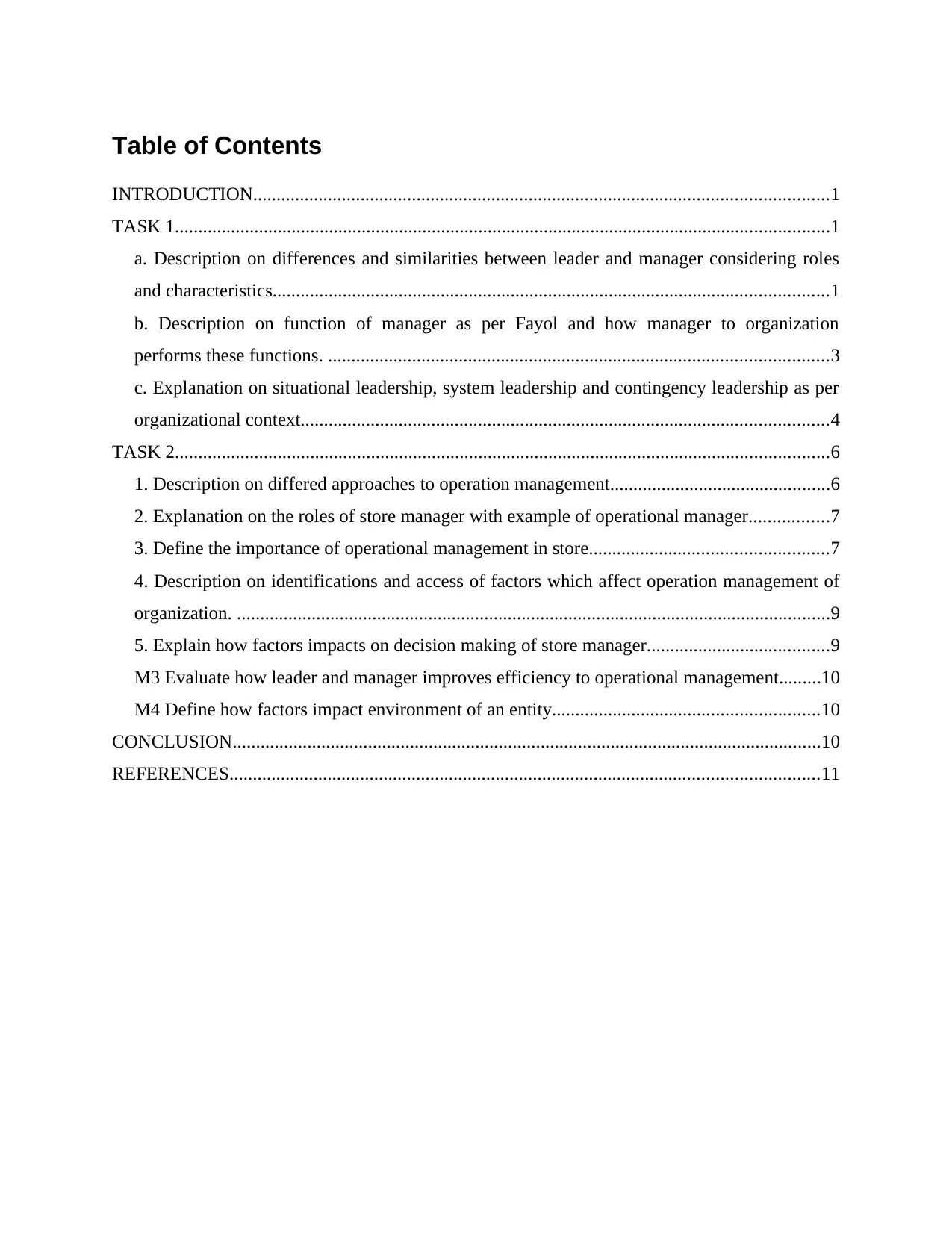
Table of Contents
INTRODUCTION...........................................................................................................................1
TASK 1............................................................................................................................................1
a. Description on differences and similarities between leader and manager considering roles
and characteristics.......................................................................................................................1
b. Description on function of manager as per Fayol and how manager to organization
performs these functions. ...........................................................................................................3
c. Explanation on situational leadership, system leadership and contingency leadership as per
organizational context.................................................................................................................4
TASK 2............................................................................................................................................6
1. Description on differed approaches to operation management...............................................6
2. Explanation on the roles of store manager with example of operational manager.................7
3. Define the importance of operational management in store...................................................7
4. Description on identifications and access of factors which affect operation management of
organization. ...............................................................................................................................9
5. Explain how factors impacts on decision making of store manager.......................................9
M3 Evaluate how leader and manager improves efficiency to operational management.........10
M4 Define how factors impact environment of an entity.........................................................10
CONCLUSION..............................................................................................................................10
REFERENCES..............................................................................................................................11
INTRODUCTION...........................................................................................................................1
TASK 1............................................................................................................................................1
a. Description on differences and similarities between leader and manager considering roles
and characteristics.......................................................................................................................1
b. Description on function of manager as per Fayol and how manager to organization
performs these functions. ...........................................................................................................3
c. Explanation on situational leadership, system leadership and contingency leadership as per
organizational context.................................................................................................................4
TASK 2............................................................................................................................................6
1. Description on differed approaches to operation management...............................................6
2. Explanation on the roles of store manager with example of operational manager.................7
3. Define the importance of operational management in store...................................................7
4. Description on identifications and access of factors which affect operation management of
organization. ...............................................................................................................................9
5. Explain how factors impacts on decision making of store manager.......................................9
M3 Evaluate how leader and manager improves efficiency to operational management.........10
M4 Define how factors impact environment of an entity.........................................................10
CONCLUSION..............................................................................................................................10
REFERENCES..............................................................................................................................11
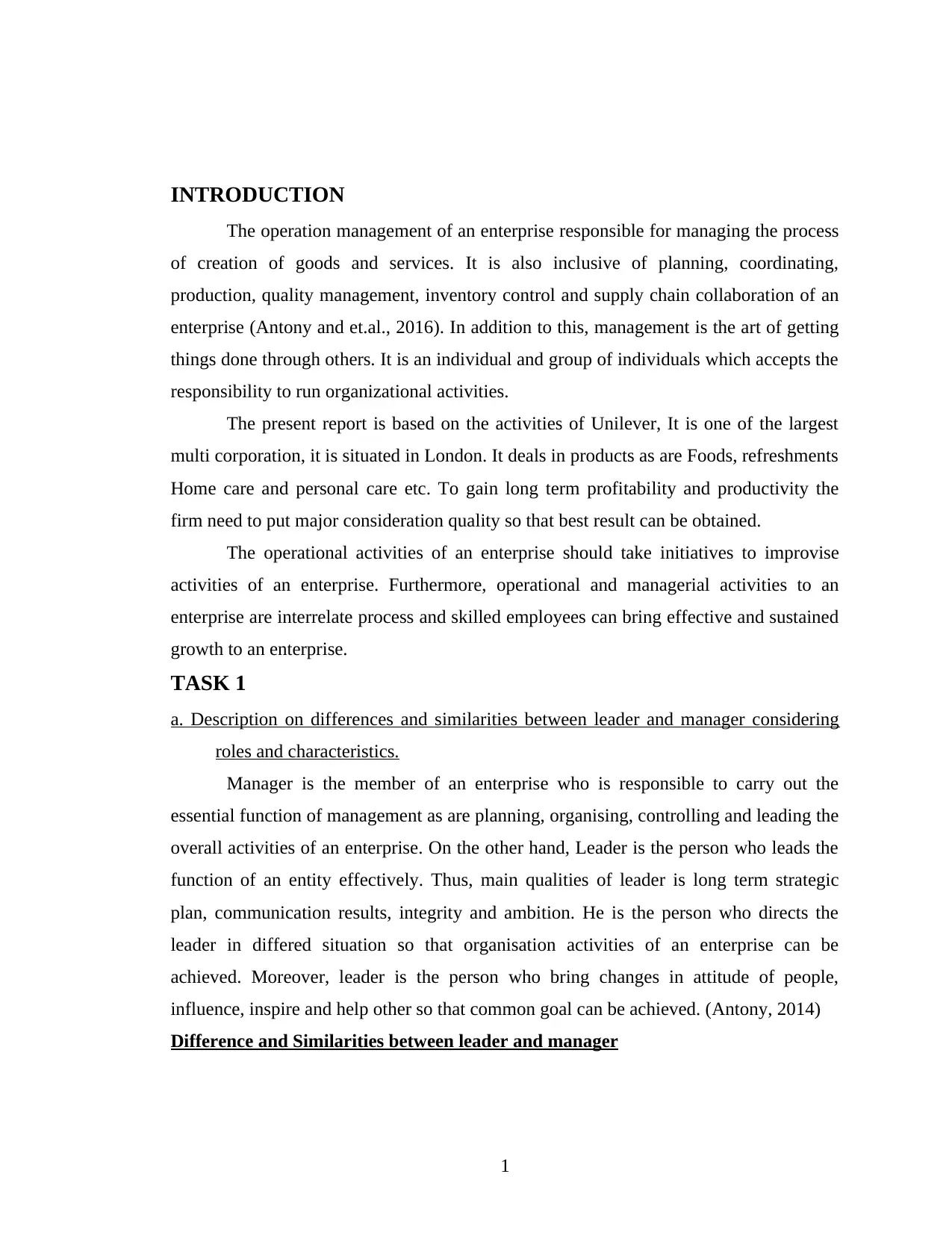
INTRODUCTION
The operation management of an enterprise responsible for managing the process
of creation of goods and services. It is also inclusive of planning, coordinating,
production, quality management, inventory control and supply chain collaboration of an
enterprise (Antony and et.al., 2016). In addition to this, management is the art of getting
things done through others. It is an individual and group of individuals which accepts the
responsibility to run organizational activities.
The present report is based on the activities of Unilever, It is one of the largest
multi corporation, it is situated in London. It deals in products as are Foods, refreshments
Home care and personal care etc. To gain long term profitability and productivity the
firm need to put major consideration quality so that best result can be obtained.
The operational activities of an enterprise should take initiatives to improvise
activities of an enterprise. Furthermore, operational and managerial activities to an
enterprise are interrelate process and skilled employees can bring effective and sustained
growth to an enterprise.
TASK 1
a. Description on differences and similarities between leader and manager considering
roles and characteristics.
Manager is the member of an enterprise who is responsible to carry out the
essential function of management as are planning, organising, controlling and leading the
overall activities of an enterprise. On the other hand, Leader is the person who leads the
function of an entity effectively. Thus, main qualities of leader is long term strategic
plan, communication results, integrity and ambition. He is the person who directs the
leader in differed situation so that organisation activities of an enterprise can be
achieved. Moreover, leader is the person who bring changes in attitude of people,
influence, inspire and help other so that common goal can be achieved. (Antony, 2014)
Difference and Similarities between leader and manager
1
The operation management of an enterprise responsible for managing the process
of creation of goods and services. It is also inclusive of planning, coordinating,
production, quality management, inventory control and supply chain collaboration of an
enterprise (Antony and et.al., 2016). In addition to this, management is the art of getting
things done through others. It is an individual and group of individuals which accepts the
responsibility to run organizational activities.
The present report is based on the activities of Unilever, It is one of the largest
multi corporation, it is situated in London. It deals in products as are Foods, refreshments
Home care and personal care etc. To gain long term profitability and productivity the
firm need to put major consideration quality so that best result can be obtained.
The operational activities of an enterprise should take initiatives to improvise
activities of an enterprise. Furthermore, operational and managerial activities to an
enterprise are interrelate process and skilled employees can bring effective and sustained
growth to an enterprise.
TASK 1
a. Description on differences and similarities between leader and manager considering
roles and characteristics.
Manager is the member of an enterprise who is responsible to carry out the
essential function of management as are planning, organising, controlling and leading the
overall activities of an enterprise. On the other hand, Leader is the person who leads the
function of an entity effectively. Thus, main qualities of leader is long term strategic
plan, communication results, integrity and ambition. He is the person who directs the
leader in differed situation so that organisation activities of an enterprise can be
achieved. Moreover, leader is the person who bring changes in attitude of people,
influence, inspire and help other so that common goal can be achieved. (Antony, 2014)
Difference and Similarities between leader and manager
1
⊘ This is a preview!⊘
Do you want full access?
Subscribe today to unlock all pages.

Trusted by 1+ million students worldwide
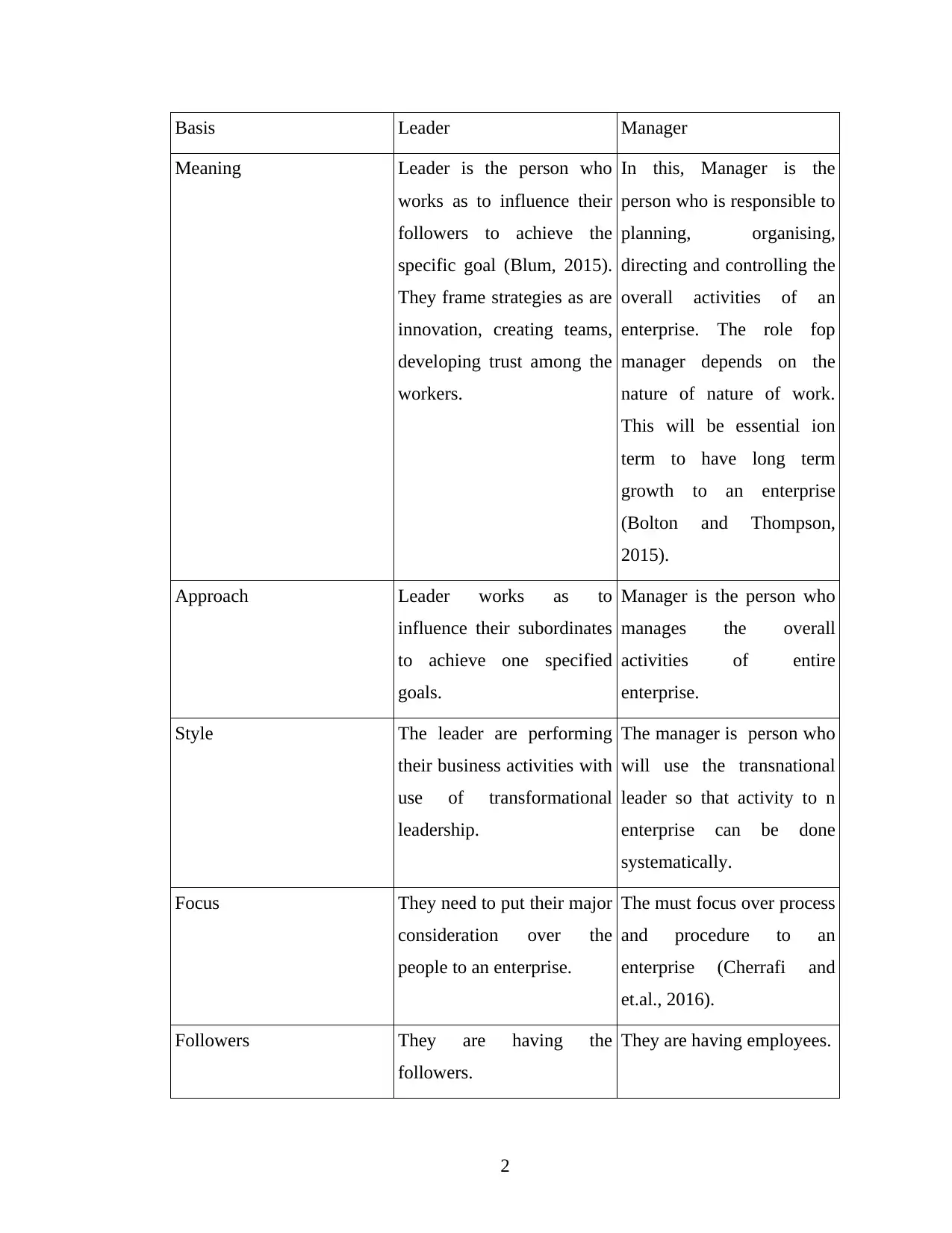
Basis Leader Manager
Meaning Leader is the person who
works as to influence their
followers to achieve the
specific goal (Blum, 2015).
They frame strategies as are
innovation, creating teams,
developing trust among the
workers.
In this, Manager is the
person who is responsible to
planning, organising,
directing and controlling the
overall activities of an
enterprise. The role fop
manager depends on the
nature of nature of work.
This will be essential ion
term to have long term
growth to an enterprise
(Bolton and Thompson,
2015).
Approach Leader works as to
influence their subordinates
to achieve one specified
goals.
Manager is the person who
manages the overall
activities of entire
enterprise.
Style The leader are performing
their business activities with
use of transformational
leadership.
The manager is person who
will use the transnational
leader so that activity to n
enterprise can be done
systematically.
Focus They need to put their major
consideration over the
people to an enterprise.
The must focus over process
and procedure to an
enterprise (Cherrafi and
et.al., 2016).
Followers They are having the
followers.
They are having employees.
2
Meaning Leader is the person who
works as to influence their
followers to achieve the
specific goal (Blum, 2015).
They frame strategies as are
innovation, creating teams,
developing trust among the
workers.
In this, Manager is the
person who is responsible to
planning, organising,
directing and controlling the
overall activities of an
enterprise. The role fop
manager depends on the
nature of nature of work.
This will be essential ion
term to have long term
growth to an enterprise
(Bolton and Thompson,
2015).
Approach Leader works as to
influence their subordinates
to achieve one specified
goals.
Manager is the person who
manages the overall
activities of entire
enterprise.
Style The leader are performing
their business activities with
use of transformational
leadership.
The manager is person who
will use the transnational
leader so that activity to n
enterprise can be done
systematically.
Focus They need to put their major
consideration over the
people to an enterprise.
The must focus over process
and procedure to an
enterprise (Cherrafi and
et.al., 2016).
Followers They are having the
followers.
They are having employees.
2
Paraphrase This Document
Need a fresh take? Get an instant paraphrase of this document with our AI Paraphraser
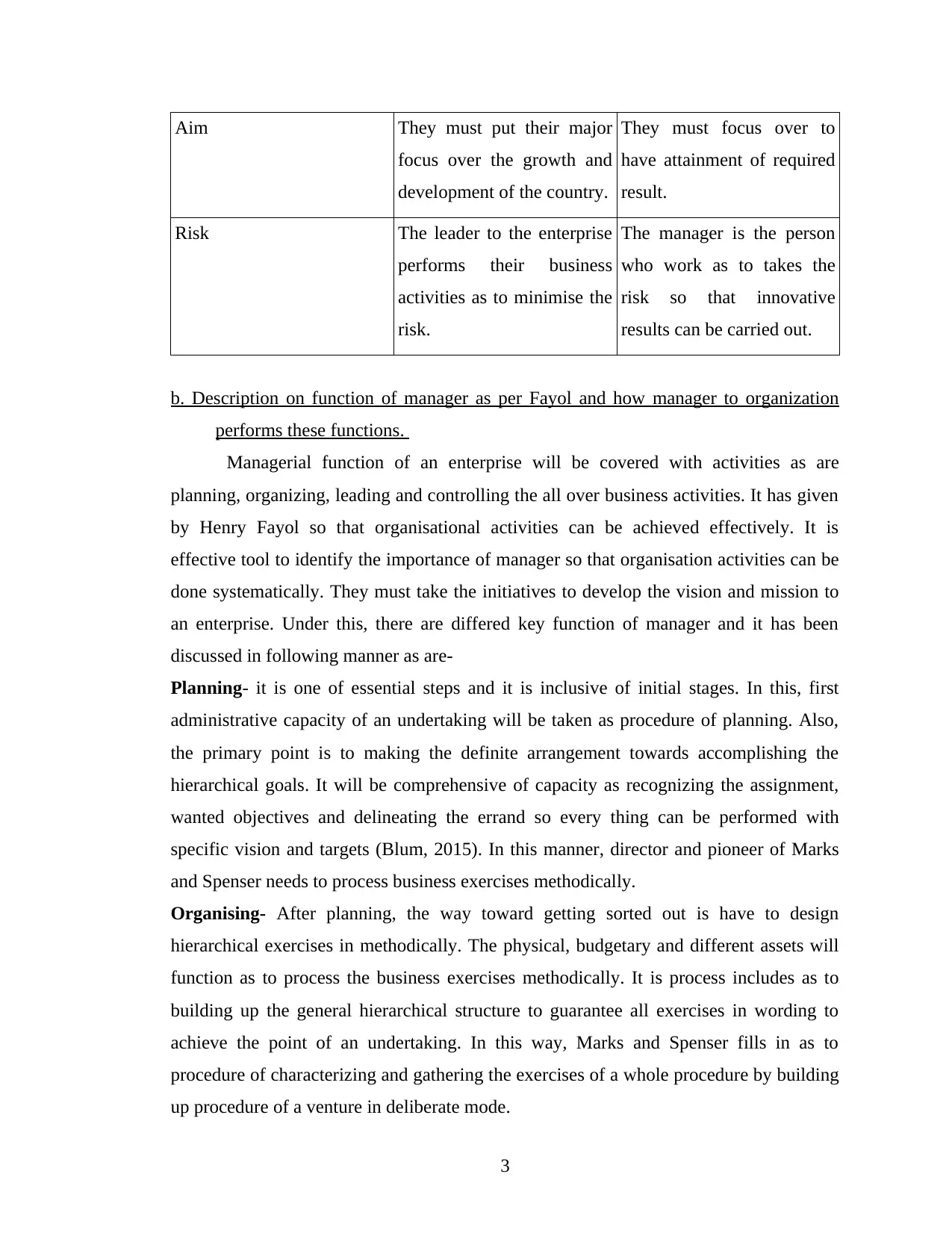
Aim They must put their major
focus over the growth and
development of the country.
They must focus over to
have attainment of required
result.
Risk The leader to the enterprise
performs their business
activities as to minimise the
risk.
The manager is the person
who work as to takes the
risk so that innovative
results can be carried out.
b. Description on function of manager as per Fayol and how manager to organization
performs these functions.
Managerial function of an enterprise will be covered with activities as are
planning, organizing, leading and controlling the all over business activities. It has given
by Henry Fayol so that organisational activities can be achieved effectively. It is
effective tool to identify the importance of manager so that organisation activities can be
done systematically. They must take the initiatives to develop the vision and mission to
an enterprise. Under this, there are differed key function of manager and it has been
discussed in following manner as are-
Planning- it is one of essential steps and it is inclusive of initial stages. In this, first
administrative capacity of an undertaking will be taken as procedure of planning. Also,
the primary point is to making the definite arrangement towards accomplishing the
hierarchical goals. It will be comprehensive of capacity as recognizing the assignment,
wanted objectives and delineating the errand so every thing can be performed with
specific vision and targets (Blum, 2015). In this manner, director and pioneer of Marks
and Spenser needs to process business exercises methodically.
Organising- After planning, the way toward getting sorted out is have to design
hierarchical exercises in methodically. The physical, budgetary and different assets will
function as to process the business exercises methodically. It is process includes as to
building up the general hierarchical structure to guarantee all exercises in wording to
achieve the point of an undertaking. In this way, Marks and Spenser fills in as to
procedure of characterizing and gathering the exercises of a whole procedure by building
up procedure of a venture in deliberate mode.
3
focus over the growth and
development of the country.
They must focus over to
have attainment of required
result.
Risk The leader to the enterprise
performs their business
activities as to minimise the
risk.
The manager is the person
who work as to takes the
risk so that innovative
results can be carried out.
b. Description on function of manager as per Fayol and how manager to organization
performs these functions.
Managerial function of an enterprise will be covered with activities as are
planning, organizing, leading and controlling the all over business activities. It has given
by Henry Fayol so that organisational activities can be achieved effectively. It is
effective tool to identify the importance of manager so that organisation activities can be
done systematically. They must take the initiatives to develop the vision and mission to
an enterprise. Under this, there are differed key function of manager and it has been
discussed in following manner as are-
Planning- it is one of essential steps and it is inclusive of initial stages. In this, first
administrative capacity of an undertaking will be taken as procedure of planning. Also,
the primary point is to making the definite arrangement towards accomplishing the
hierarchical goals. It will be comprehensive of capacity as recognizing the assignment,
wanted objectives and delineating the errand so every thing can be performed with
specific vision and targets (Blum, 2015). In this manner, director and pioneer of Marks
and Spenser needs to process business exercises methodically.
Organising- After planning, the way toward getting sorted out is have to design
hierarchical exercises in methodically. The physical, budgetary and different assets will
function as to process the business exercises methodically. It is process includes as to
building up the general hierarchical structure to guarantee all exercises in wording to
achieve the point of an undertaking. In this way, Marks and Spenser fills in as to
procedure of characterizing and gathering the exercises of a whole procedure by building
up procedure of a venture in deliberate mode.
3
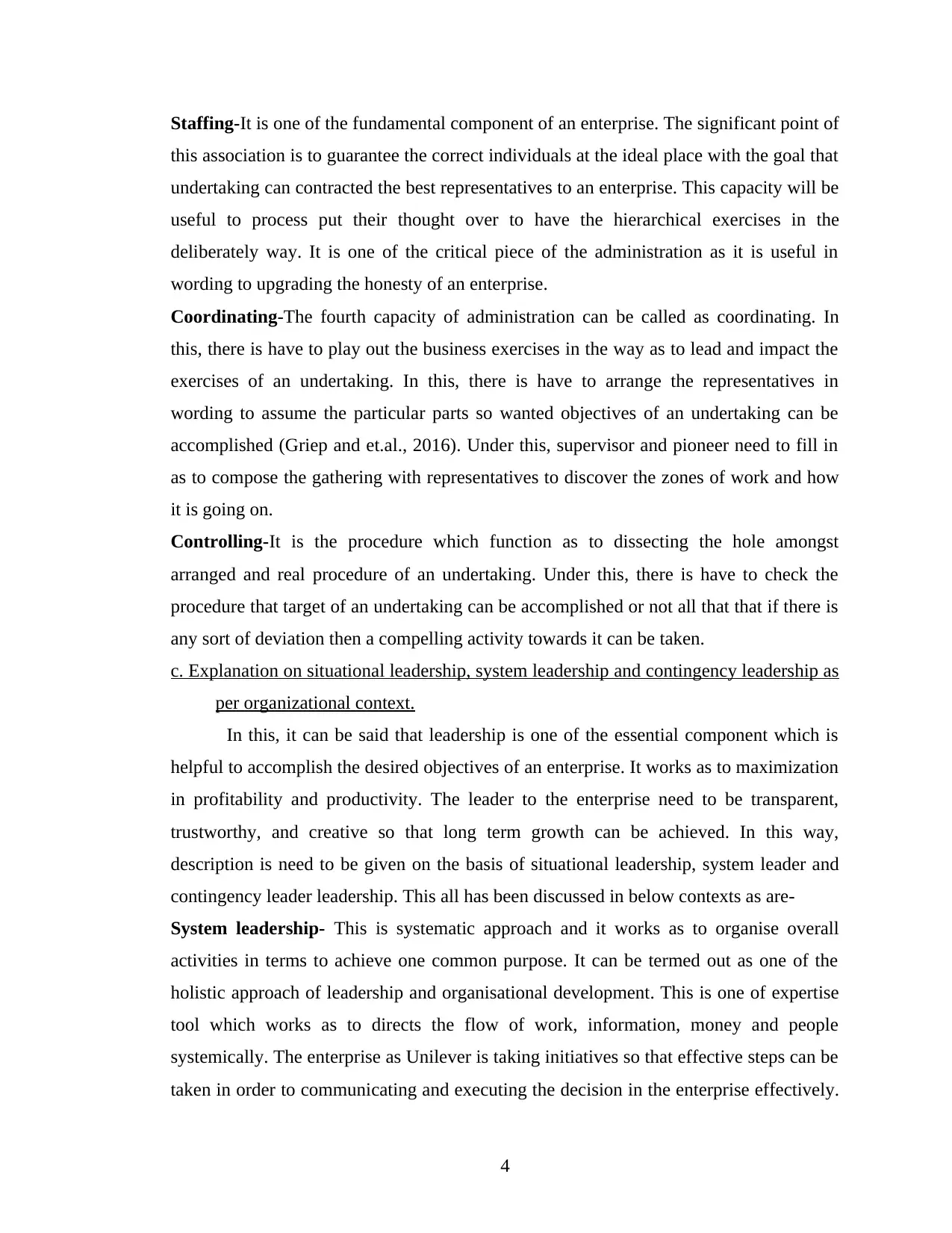
Staffing-It is one of the fundamental component of an enterprise. The significant point of
this association is to guarantee the correct individuals at the ideal place with the goal that
undertaking can contracted the best representatives to an enterprise. This capacity will be
useful to process put their thought over to have the hierarchical exercises in the
deliberately way. It is one of the critical piece of the administration as it is useful in
wording to upgrading the honesty of an enterprise.
Coordinating-The fourth capacity of administration can be called as coordinating. In
this, there is have to play out the business exercises in the way as to lead and impact the
exercises of an undertaking. In this, there is have to arrange the representatives in
wording to assume the particular parts so wanted objectives of an undertaking can be
accomplished (Griep and et.al., 2016). Under this, supervisor and pioneer need to fill in
as to compose the gathering with representatives to discover the zones of work and how
it is going on.
Controlling-It is the procedure which function as to dissecting the hole amongst
arranged and real procedure of an undertaking. Under this, there is have to check the
procedure that target of an undertaking can be accomplished or not all that that if there is
any sort of deviation then a compelling activity towards it can be taken.
c. Explanation on situational leadership, system leadership and contingency leadership as
per organizational context.
In this, it can be said that leadership is one of the essential component which is
helpful to accomplish the desired objectives of an enterprise. It works as to maximization
in profitability and productivity. The leader to the enterprise need to be transparent,
trustworthy, and creative so that long term growth can be achieved. In this way,
description is need to be given on the basis of situational leadership, system leader and
contingency leader leadership. This all has been discussed in below contexts as are-
System leadership- This is systematic approach and it works as to organise overall
activities in terms to achieve one common purpose. It can be termed out as one of the
holistic approach of leadership and organisational development. This is one of expertise
tool which works as to directs the flow of work, information, money and people
systemically. The enterprise as Unilever is taking initiatives so that effective steps can be
taken in order to communicating and executing the decision in the enterprise effectively.
4
this association is to guarantee the correct individuals at the ideal place with the goal that
undertaking can contracted the best representatives to an enterprise. This capacity will be
useful to process put their thought over to have the hierarchical exercises in the
deliberately way. It is one of the critical piece of the administration as it is useful in
wording to upgrading the honesty of an enterprise.
Coordinating-The fourth capacity of administration can be called as coordinating. In
this, there is have to play out the business exercises in the way as to lead and impact the
exercises of an undertaking. In this, there is have to arrange the representatives in
wording to assume the particular parts so wanted objectives of an undertaking can be
accomplished (Griep and et.al., 2016). Under this, supervisor and pioneer need to fill in
as to compose the gathering with representatives to discover the zones of work and how
it is going on.
Controlling-It is the procedure which function as to dissecting the hole amongst
arranged and real procedure of an undertaking. Under this, there is have to check the
procedure that target of an undertaking can be accomplished or not all that that if there is
any sort of deviation then a compelling activity towards it can be taken.
c. Explanation on situational leadership, system leadership and contingency leadership as
per organizational context.
In this, it can be said that leadership is one of the essential component which is
helpful to accomplish the desired objectives of an enterprise. It works as to maximization
in profitability and productivity. The leader to the enterprise need to be transparent,
trustworthy, and creative so that long term growth can be achieved. In this way,
description is need to be given on the basis of situational leadership, system leader and
contingency leader leadership. This all has been discussed in below contexts as are-
System leadership- This is systematic approach and it works as to organise overall
activities in terms to achieve one common purpose. It can be termed out as one of the
holistic approach of leadership and organisational development. This is one of expertise
tool which works as to directs the flow of work, information, money and people
systemically. The enterprise as Unilever is taking initiatives so that effective steps can be
taken in order to communicating and executing the decision in the enterprise effectively.
4
⊘ This is a preview!⊘
Do you want full access?
Subscribe today to unlock all pages.

Trusted by 1+ million students worldwide
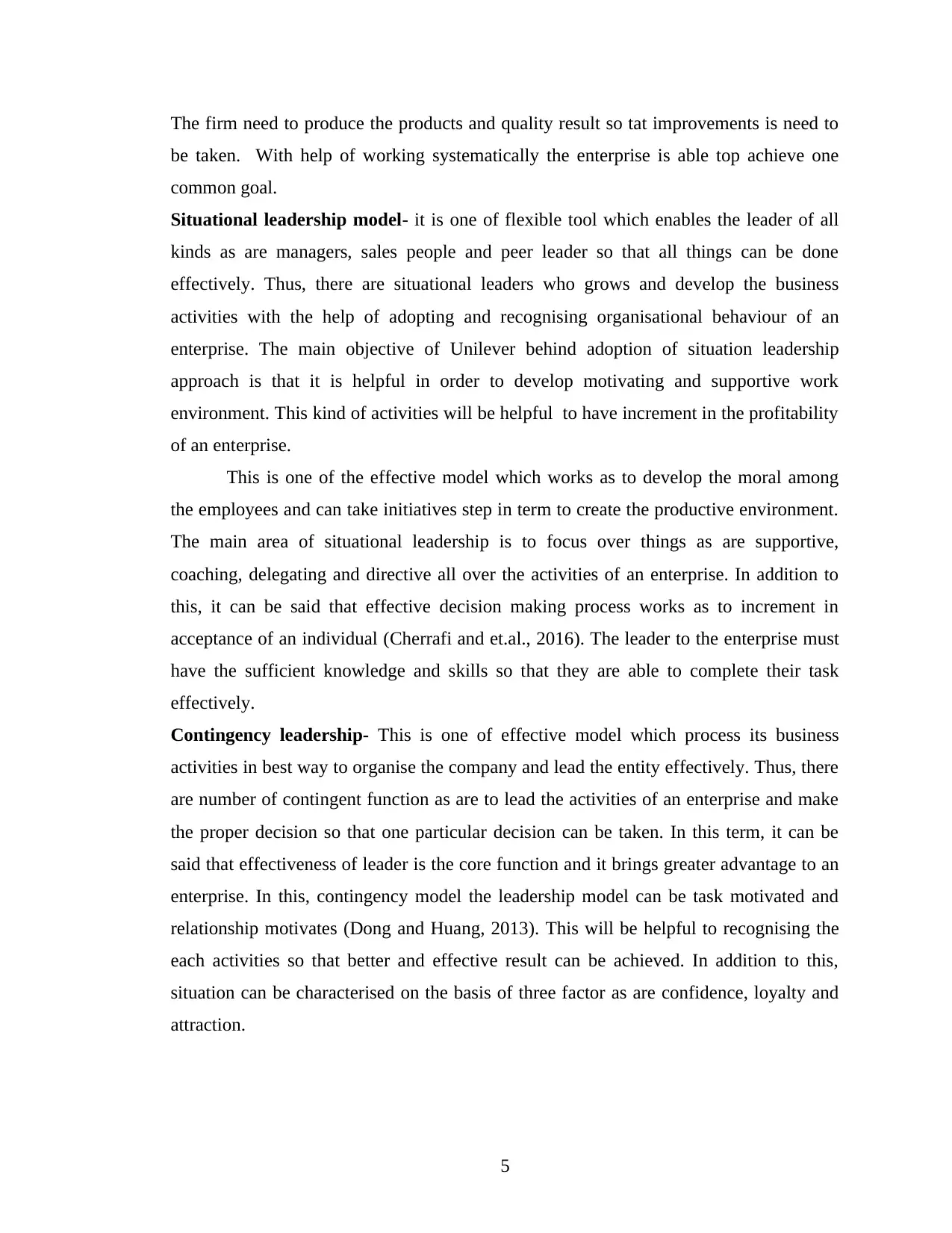
The firm need to produce the products and quality result so tat improvements is need to
be taken. With help of working systematically the enterprise is able top achieve one
common goal.
Situational leadership model- it is one of flexible tool which enables the leader of all
kinds as are managers, sales people and peer leader so that all things can be done
effectively. Thus, there are situational leaders who grows and develop the business
activities with the help of adopting and recognising organisational behaviour of an
enterprise. The main objective of Unilever behind adoption of situation leadership
approach is that it is helpful in order to develop motivating and supportive work
environment. This kind of activities will be helpful to have increment in the profitability
of an enterprise.
This is one of the effective model which works as to develop the moral among
the employees and can take initiatives step in term to create the productive environment.
The main area of situational leadership is to focus over things as are supportive,
coaching, delegating and directive all over the activities of an enterprise. In addition to
this, it can be said that effective decision making process works as to increment in
acceptance of an individual (Cherrafi and et.al., 2016). The leader to the enterprise must
have the sufficient knowledge and skills so that they are able to complete their task
effectively.
Contingency leadership- This is one of effective model which process its business
activities in best way to organise the company and lead the entity effectively. Thus, there
are number of contingent function as are to lead the activities of an enterprise and make
the proper decision so that one particular decision can be taken. In this term, it can be
said that effectiveness of leader is the core function and it brings greater advantage to an
enterprise. In this, contingency model the leadership model can be task motivated and
relationship motivates (Dong and Huang, 2013). This will be helpful to recognising the
each activities so that better and effective result can be achieved. In addition to this,
situation can be characterised on the basis of three factor as are confidence, loyalty and
attraction.
5
be taken. With help of working systematically the enterprise is able top achieve one
common goal.
Situational leadership model- it is one of flexible tool which enables the leader of all
kinds as are managers, sales people and peer leader so that all things can be done
effectively. Thus, there are situational leaders who grows and develop the business
activities with the help of adopting and recognising organisational behaviour of an
enterprise. The main objective of Unilever behind adoption of situation leadership
approach is that it is helpful in order to develop motivating and supportive work
environment. This kind of activities will be helpful to have increment in the profitability
of an enterprise.
This is one of the effective model which works as to develop the moral among
the employees and can take initiatives step in term to create the productive environment.
The main area of situational leadership is to focus over things as are supportive,
coaching, delegating and directive all over the activities of an enterprise. In addition to
this, it can be said that effective decision making process works as to increment in
acceptance of an individual (Cherrafi and et.al., 2016). The leader to the enterprise must
have the sufficient knowledge and skills so that they are able to complete their task
effectively.
Contingency leadership- This is one of effective model which process its business
activities in best way to organise the company and lead the entity effectively. Thus, there
are number of contingent function as are to lead the activities of an enterprise and make
the proper decision so that one particular decision can be taken. In this term, it can be
said that effectiveness of leader is the core function and it brings greater advantage to an
enterprise. In this, contingency model the leadership model can be task motivated and
relationship motivates (Dong and Huang, 2013). This will be helpful to recognising the
each activities so that better and effective result can be achieved. In addition to this,
situation can be characterised on the basis of three factor as are confidence, loyalty and
attraction.
5
Paraphrase This Document
Need a fresh take? Get an instant paraphrase of this document with our AI Paraphraser
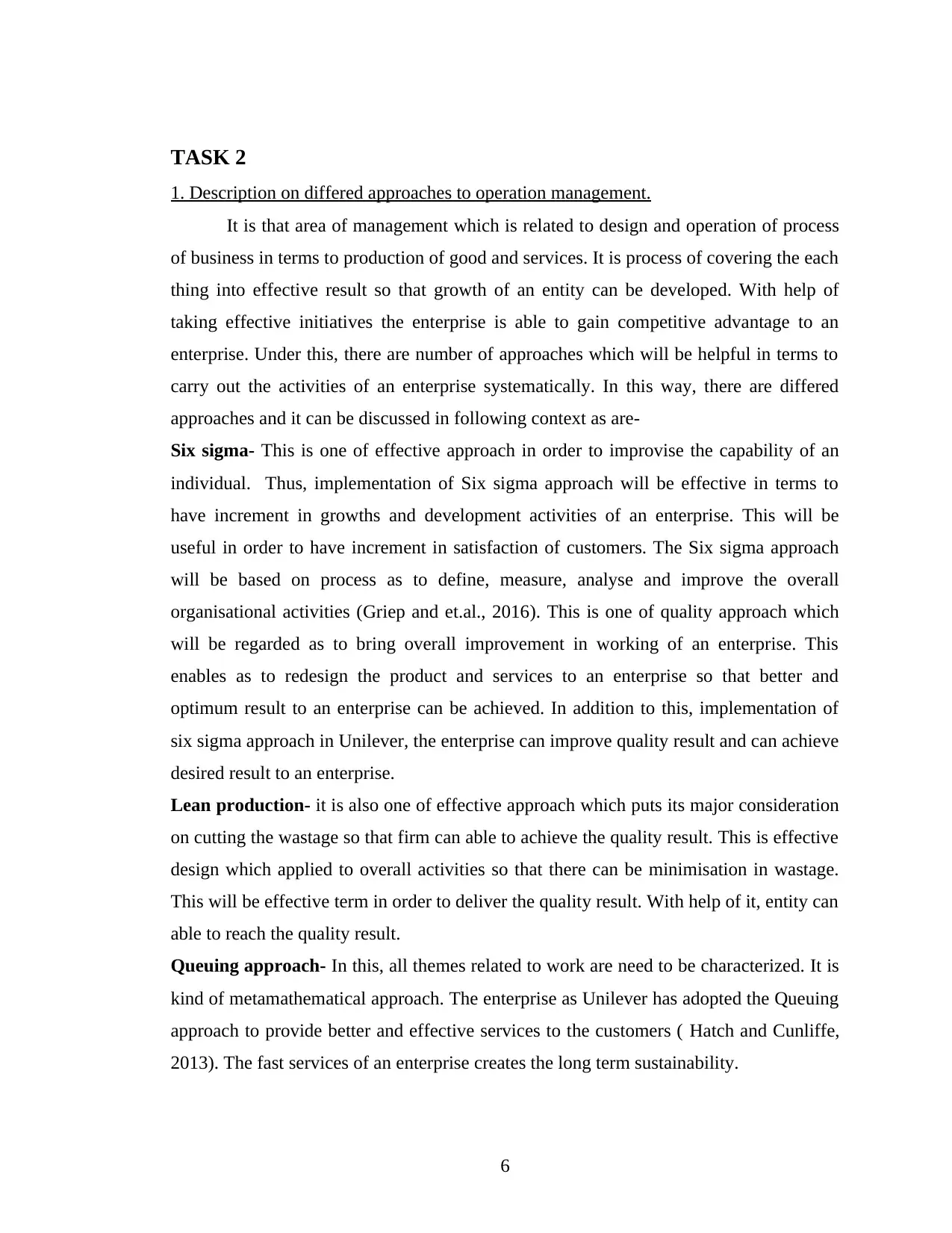
TASK 2
1. Description on differed approaches to operation management.
It is that area of management which is related to design and operation of process
of business in terms to production of good and services. It is process of covering the each
thing into effective result so that growth of an entity can be developed. With help of
taking effective initiatives the enterprise is able to gain competitive advantage to an
enterprise. Under this, there are number of approaches which will be helpful in terms to
carry out the activities of an enterprise systematically. In this way, there are differed
approaches and it can be discussed in following context as are-
Six sigma- This is one of effective approach in order to improvise the capability of an
individual. Thus, implementation of Six sigma approach will be effective in terms to
have increment in growths and development activities of an enterprise. This will be
useful in order to have increment in satisfaction of customers. The Six sigma approach
will be based on process as to define, measure, analyse and improve the overall
organisational activities (Griep and et.al., 2016). This is one of quality approach which
will be regarded as to bring overall improvement in working of an enterprise. This
enables as to redesign the product and services to an enterprise so that better and
optimum result to an enterprise can be achieved. In addition to this, implementation of
six sigma approach in Unilever, the enterprise can improve quality result and can achieve
desired result to an enterprise.
Lean production- it is also one of effective approach which puts its major consideration
on cutting the wastage so that firm can able to achieve the quality result. This is effective
design which applied to overall activities so that there can be minimisation in wastage.
This will be effective term in order to deliver the quality result. With help of it, entity can
able to reach the quality result.
Queuing approach- In this, all themes related to work are need to be characterized. It is
kind of metamathematical approach. The enterprise as Unilever has adopted the Queuing
approach to provide better and effective services to the customers ( Hatch and Cunliffe,
2013). The fast services of an enterprise creates the long term sustainability.
6
1. Description on differed approaches to operation management.
It is that area of management which is related to design and operation of process
of business in terms to production of good and services. It is process of covering the each
thing into effective result so that growth of an entity can be developed. With help of
taking effective initiatives the enterprise is able to gain competitive advantage to an
enterprise. Under this, there are number of approaches which will be helpful in terms to
carry out the activities of an enterprise systematically. In this way, there are differed
approaches and it can be discussed in following context as are-
Six sigma- This is one of effective approach in order to improvise the capability of an
individual. Thus, implementation of Six sigma approach will be effective in terms to
have increment in growths and development activities of an enterprise. This will be
useful in order to have increment in satisfaction of customers. The Six sigma approach
will be based on process as to define, measure, analyse and improve the overall
organisational activities (Griep and et.al., 2016). This is one of quality approach which
will be regarded as to bring overall improvement in working of an enterprise. This
enables as to redesign the product and services to an enterprise so that better and
optimum result to an enterprise can be achieved. In addition to this, implementation of
six sigma approach in Unilever, the enterprise can improve quality result and can achieve
desired result to an enterprise.
Lean production- it is also one of effective approach which puts its major consideration
on cutting the wastage so that firm can able to achieve the quality result. This is effective
design which applied to overall activities so that there can be minimisation in wastage.
This will be effective term in order to deliver the quality result. With help of it, entity can
able to reach the quality result.
Queuing approach- In this, all themes related to work are need to be characterized. It is
kind of metamathematical approach. The enterprise as Unilever has adopted the Queuing
approach to provide better and effective services to the customers ( Hatch and Cunliffe,
2013). The fast services of an enterprise creates the long term sustainability.
6

2. Explanation on the roles of store manager with example of operational manager.
The store manager of an enterprise can be termed out to be a person who is
responsible to carry out the day to day activities of an enterprise. The brand image of n
enterprise can be maintained if they are performing good business activities. In this way,
there are some role of store manager which will be inclusive things as are recruiting,
supervising, training appraising staff so that better result can be achieved.
Recruiting employees for store is his prime responsibility-
In this, it can be said that the one of the major role of store manager is to provide
good services to customer so that they can feel motivated.
Under this, managing the overall employees is one of foremost duty of store
manager. This is also inclusive of management of employees and it is inclusive of
levels as are sales staff, store staff, cleaning staff and clerical staff.
It is responsibility of store manger to carry out the business activities as are
displaying merchandise, refilling of stock and maintenance of sales records
effectively (Bolton and Thompson, 2015).
In this, store manager carry out the process as implementation of policies so that
better and effective result can be processed. Furthermore, it can be said that the
task of minimising the cost is essential if organisation is following low cost
policy ( Goodall and Pogrebna, 2015).
In this, very first duty of the store manager is to do the process of recruitment in
effective way. With the hiring of right candidate at the right place. The better and
effective result can be achieved. Moreover, recruiting, training and development
of an individual is one of the core element which driver systematic working in
enterprise.
Retail manager should be responsible person as they need to the strategic
direction to an enterprise.
3. Define the importance of operational management in store.
In this, operational activities to the firm plays significant part in big business in
wording to deal with plan, task and upkeep so every thing should be possible in
successful way. The Marks and Spenser is capable to deal with the capacity as to have
powerful planning, sorting out, planning and controlling the business exercises in
7
The store manager of an enterprise can be termed out to be a person who is
responsible to carry out the day to day activities of an enterprise. The brand image of n
enterprise can be maintained if they are performing good business activities. In this way,
there are some role of store manager which will be inclusive things as are recruiting,
supervising, training appraising staff so that better result can be achieved.
Recruiting employees for store is his prime responsibility-
In this, it can be said that the one of the major role of store manager is to provide
good services to customer so that they can feel motivated.
Under this, managing the overall employees is one of foremost duty of store
manager. This is also inclusive of management of employees and it is inclusive of
levels as are sales staff, store staff, cleaning staff and clerical staff.
It is responsibility of store manger to carry out the business activities as are
displaying merchandise, refilling of stock and maintenance of sales records
effectively (Bolton and Thompson, 2015).
In this, store manager carry out the process as implementation of policies so that
better and effective result can be processed. Furthermore, it can be said that the
task of minimising the cost is essential if organisation is following low cost
policy ( Goodall and Pogrebna, 2015).
In this, very first duty of the store manager is to do the process of recruitment in
effective way. With the hiring of right candidate at the right place. The better and
effective result can be achieved. Moreover, recruiting, training and development
of an individual is one of the core element which driver systematic working in
enterprise.
Retail manager should be responsible person as they need to the strategic
direction to an enterprise.
3. Define the importance of operational management in store.
In this, operational activities to the firm plays significant part in big business in
wording to deal with plan, task and upkeep so every thing should be possible in
successful way. The Marks and Spenser is capable to deal with the capacity as to have
powerful planning, sorting out, planning and controlling the business exercises in
7
⊘ This is a preview!⊘
Do you want full access?
Subscribe today to unlock all pages.

Trusted by 1+ million students worldwide
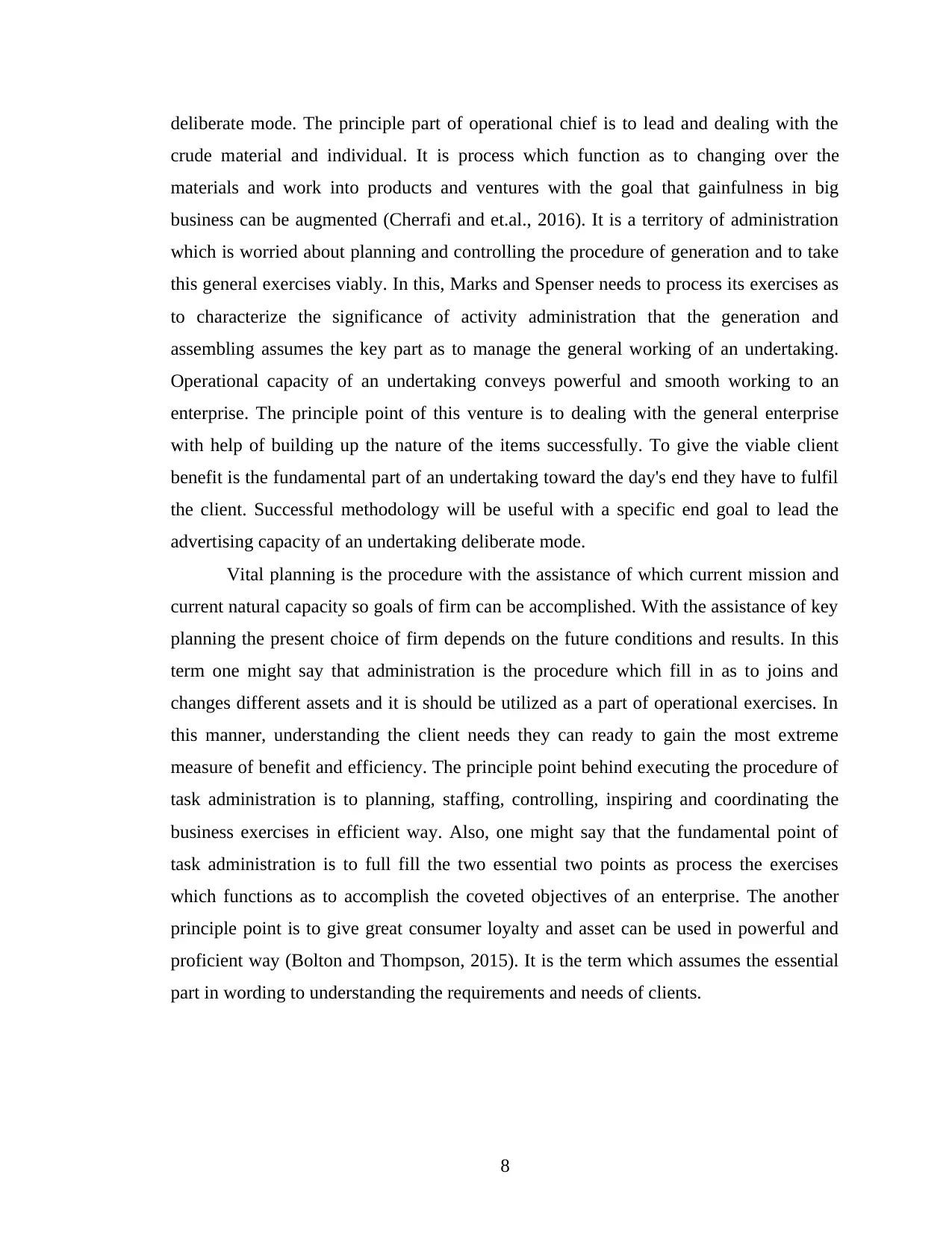
deliberate mode. The principle part of operational chief is to lead and dealing with the
crude material and individual. It is process which function as to changing over the
materials and work into products and ventures with the goal that gainfulness in big
business can be augmented (Cherrafi and et.al., 2016). It is a territory of administration
which is worried about planning and controlling the procedure of generation and to take
this general exercises viably. In this, Marks and Spenser needs to process its exercises as
to characterize the significance of activity administration that the generation and
assembling assumes the key part as to manage the general working of an undertaking.
Operational capacity of an undertaking conveys powerful and smooth working to an
enterprise. The principle point of this venture is to dealing with the general enterprise
with help of building up the nature of the items successfully. To give the viable client
benefit is the fundamental part of an undertaking toward the day's end they have to fulfil
the client. Successful methodology will be useful with a specific end goal to lead the
advertising capacity of an undertaking deliberate mode.
Vital planning is the procedure with the assistance of which current mission and
current natural capacity so goals of firm can be accomplished. With the assistance of key
planning the present choice of firm depends on the future conditions and results. In this
term one might say that administration is the procedure which fill in as to joins and
changes different assets and it is should be utilized as a part of operational exercises. In
this manner, understanding the client needs they can ready to gain the most extreme
measure of benefit and efficiency. The principle point behind executing the procedure of
task administration is to planning, staffing, controlling, inspiring and coordinating the
business exercises in efficient way. Also, one might say that the fundamental point of
task administration is to full fill the two essential two points as process the exercises
which functions as to accomplish the coveted objectives of an enterprise. The another
principle point is to give great consumer loyalty and asset can be used in powerful and
proficient way (Bolton and Thompson, 2015). It is the term which assumes the essential
part in wording to understanding the requirements and needs of clients.
8
crude material and individual. It is process which function as to changing over the
materials and work into products and ventures with the goal that gainfulness in big
business can be augmented (Cherrafi and et.al., 2016). It is a territory of administration
which is worried about planning and controlling the procedure of generation and to take
this general exercises viably. In this, Marks and Spenser needs to process its exercises as
to characterize the significance of activity administration that the generation and
assembling assumes the key part as to manage the general working of an undertaking.
Operational capacity of an undertaking conveys powerful and smooth working to an
enterprise. The principle point of this venture is to dealing with the general enterprise
with help of building up the nature of the items successfully. To give the viable client
benefit is the fundamental part of an undertaking toward the day's end they have to fulfil
the client. Successful methodology will be useful with a specific end goal to lead the
advertising capacity of an undertaking deliberate mode.
Vital planning is the procedure with the assistance of which current mission and
current natural capacity so goals of firm can be accomplished. With the assistance of key
planning the present choice of firm depends on the future conditions and results. In this
term one might say that administration is the procedure which fill in as to joins and
changes different assets and it is should be utilized as a part of operational exercises. In
this manner, understanding the client needs they can ready to gain the most extreme
measure of benefit and efficiency. The principle point behind executing the procedure of
task administration is to planning, staffing, controlling, inspiring and coordinating the
business exercises in efficient way. Also, one might say that the fundamental point of
task administration is to full fill the two essential two points as process the exercises
which functions as to accomplish the coveted objectives of an enterprise. The another
principle point is to give great consumer loyalty and asset can be used in powerful and
proficient way (Bolton and Thompson, 2015). It is the term which assumes the essential
part in wording to understanding the requirements and needs of clients.
8
Paraphrase This Document
Need a fresh take? Get an instant paraphrase of this document with our AI Paraphraser
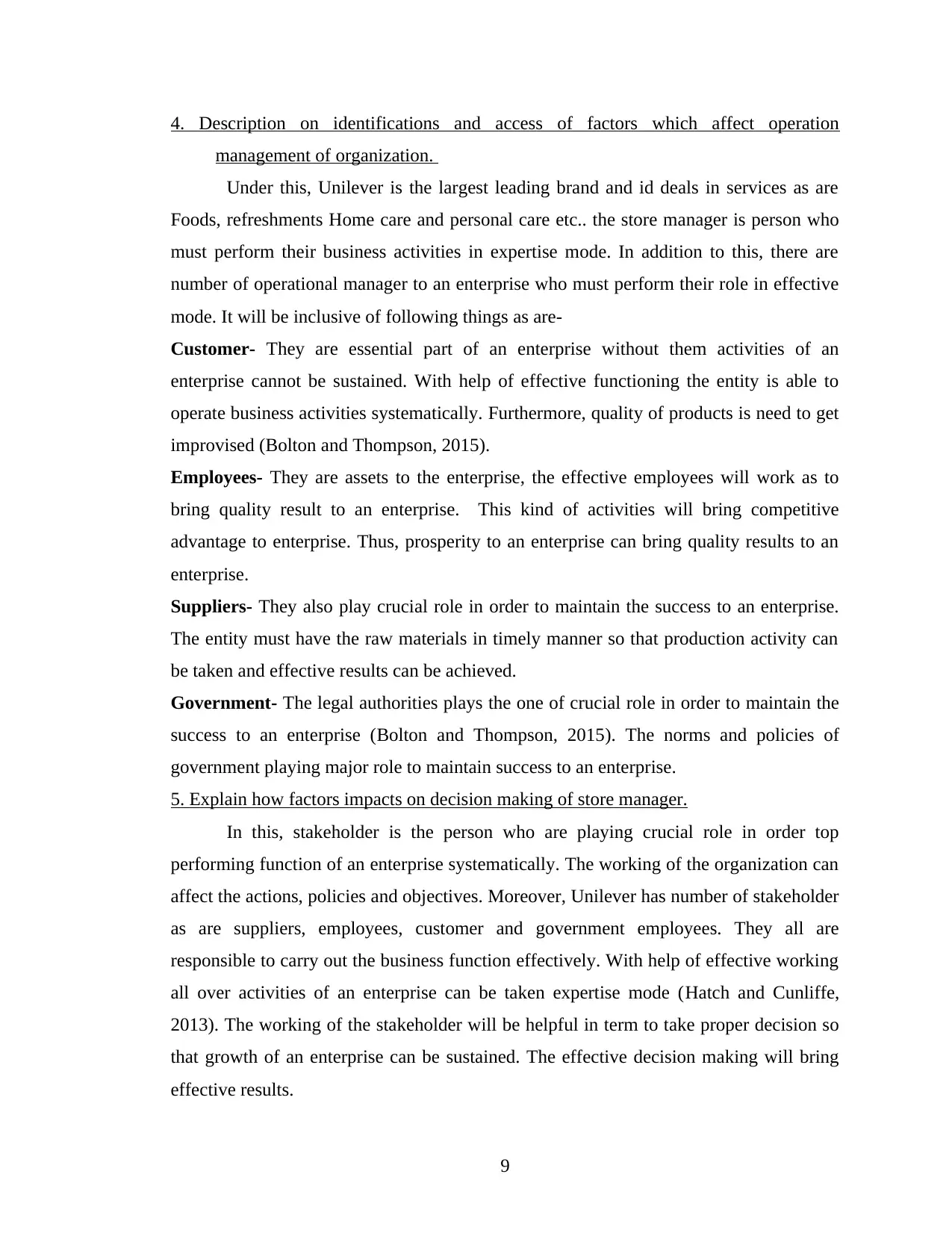
4. Description on identifications and access of factors which affect operation
management of organization.
Under this, Unilever is the largest leading brand and id deals in services as are
Foods, refreshments Home care and personal care etc.. the store manager is person who
must perform their business activities in expertise mode. In addition to this, there are
number of operational manager to an enterprise who must perform their role in effective
mode. It will be inclusive of following things as are-
Customer- They are essential part of an enterprise without them activities of an
enterprise cannot be sustained. With help of effective functioning the entity is able to
operate business activities systematically. Furthermore, quality of products is need to get
improvised (Bolton and Thompson, 2015).
Employees- They are assets to the enterprise, the effective employees will work as to
bring quality result to an enterprise. This kind of activities will bring competitive
advantage to enterprise. Thus, prosperity to an enterprise can bring quality results to an
enterprise.
Suppliers- They also play crucial role in order to maintain the success to an enterprise.
The entity must have the raw materials in timely manner so that production activity can
be taken and effective results can be achieved.
Government- The legal authorities plays the one of crucial role in order to maintain the
success to an enterprise (Bolton and Thompson, 2015). The norms and policies of
government playing major role to maintain success to an enterprise.
5. Explain how factors impacts on decision making of store manager.
In this, stakeholder is the person who are playing crucial role in order top
performing function of an enterprise systematically. The working of the organization can
affect the actions, policies and objectives. Moreover, Unilever has number of stakeholder
as are suppliers, employees, customer and government employees. They all are
responsible to carry out the business function effectively. With help of effective working
all over activities of an enterprise can be taken expertise mode (Hatch and Cunliffe,
2013). The working of the stakeholder will be helpful in term to take proper decision so
that growth of an enterprise can be sustained. The effective decision making will bring
effective results.
9
management of organization.
Under this, Unilever is the largest leading brand and id deals in services as are
Foods, refreshments Home care and personal care etc.. the store manager is person who
must perform their business activities in expertise mode. In addition to this, there are
number of operational manager to an enterprise who must perform their role in effective
mode. It will be inclusive of following things as are-
Customer- They are essential part of an enterprise without them activities of an
enterprise cannot be sustained. With help of effective functioning the entity is able to
operate business activities systematically. Furthermore, quality of products is need to get
improvised (Bolton and Thompson, 2015).
Employees- They are assets to the enterprise, the effective employees will work as to
bring quality result to an enterprise. This kind of activities will bring competitive
advantage to enterprise. Thus, prosperity to an enterprise can bring quality results to an
enterprise.
Suppliers- They also play crucial role in order to maintain the success to an enterprise.
The entity must have the raw materials in timely manner so that production activity can
be taken and effective results can be achieved.
Government- The legal authorities plays the one of crucial role in order to maintain the
success to an enterprise (Bolton and Thompson, 2015). The norms and policies of
government playing major role to maintain success to an enterprise.
5. Explain how factors impacts on decision making of store manager.
In this, stakeholder is the person who are playing crucial role in order top
performing function of an enterprise systematically. The working of the organization can
affect the actions, policies and objectives. Moreover, Unilever has number of stakeholder
as are suppliers, employees, customer and government employees. They all are
responsible to carry out the business function effectively. With help of effective working
all over activities of an enterprise can be taken expertise mode (Hatch and Cunliffe,
2013). The working of the stakeholder will be helpful in term to take proper decision so
that growth of an enterprise can be sustained. The effective decision making will bring
effective results.
9
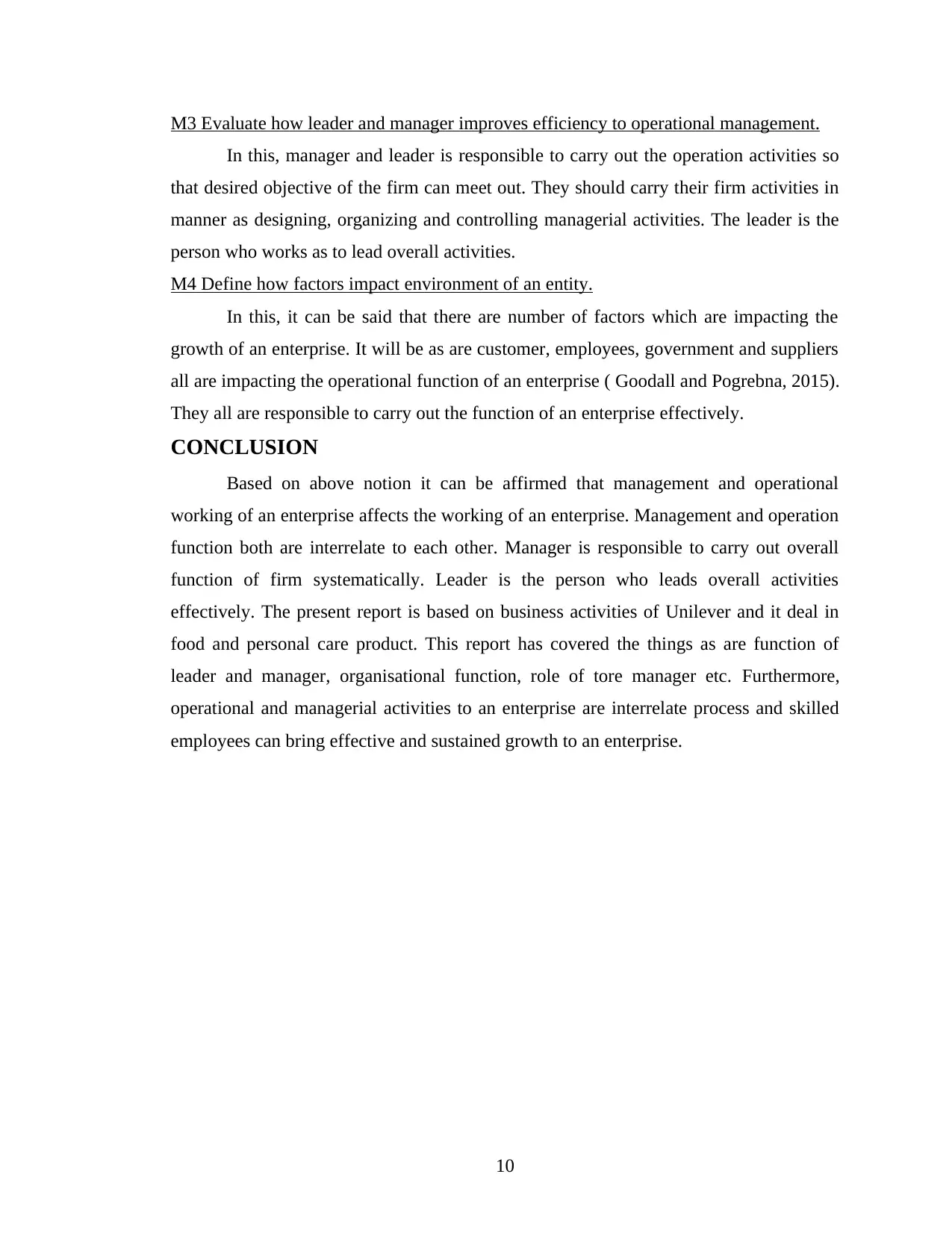
M3 Evaluate how leader and manager improves efficiency to operational management.
In this, manager and leader is responsible to carry out the operation activities so
that desired objective of the firm can meet out. They should carry their firm activities in
manner as designing, organizing and controlling managerial activities. The leader is the
person who works as to lead overall activities.
M4 Define how factors impact environment of an entity.
In this, it can be said that there are number of factors which are impacting the
growth of an enterprise. It will be as are customer, employees, government and suppliers
all are impacting the operational function of an enterprise ( Goodall and Pogrebna, 2015).
They all are responsible to carry out the function of an enterprise effectively.
CONCLUSION
Based on above notion it can be affirmed that management and operational
working of an enterprise affects the working of an enterprise. Management and operation
function both are interrelate to each other. Manager is responsible to carry out overall
function of firm systematically. Leader is the person who leads overall activities
effectively. The present report is based on business activities of Unilever and it deal in
food and personal care product. This report has covered the things as are function of
leader and manager, organisational function, role of tore manager etc. Furthermore,
operational and managerial activities to an enterprise are interrelate process and skilled
employees can bring effective and sustained growth to an enterprise.
10
In this, manager and leader is responsible to carry out the operation activities so
that desired objective of the firm can meet out. They should carry their firm activities in
manner as designing, organizing and controlling managerial activities. The leader is the
person who works as to lead overall activities.
M4 Define how factors impact environment of an entity.
In this, it can be said that there are number of factors which are impacting the
growth of an enterprise. It will be as are customer, employees, government and suppliers
all are impacting the operational function of an enterprise ( Goodall and Pogrebna, 2015).
They all are responsible to carry out the function of an enterprise effectively.
CONCLUSION
Based on above notion it can be affirmed that management and operational
working of an enterprise affects the working of an enterprise. Management and operation
function both are interrelate to each other. Manager is responsible to carry out overall
function of firm systematically. Leader is the person who leads overall activities
effectively. The present report is based on business activities of Unilever and it deal in
food and personal care product. This report has covered the things as are function of
leader and manager, organisational function, role of tore manager etc. Furthermore,
operational and managerial activities to an enterprise are interrelate process and skilled
employees can bring effective and sustained growth to an enterprise.
10
⊘ This is a preview!⊘
Do you want full access?
Subscribe today to unlock all pages.

Trusted by 1+ million students worldwide
1 out of 13
Related Documents
Your All-in-One AI-Powered Toolkit for Academic Success.
+13062052269
info@desklib.com
Available 24*7 on WhatsApp / Email
![[object Object]](/_next/static/media/star-bottom.7253800d.svg)
Unlock your academic potential
Copyright © 2020–2025 A2Z Services. All Rights Reserved. Developed and managed by ZUCOL.





